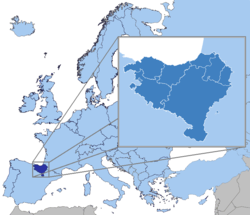The Basque Country
|
Basque Country Euskal Herria
|
|
|---|---|
|
Motto: Zazpiak Bat
|
|

Location of the Basque Country
|
|

The seven provinces of the Basque Country, as claimed by certain Basque sectors.
|
|
| Largest city | Bilbao |
| Official languages |
Basque French Spanish |
| Demonym | Basque |
| Area | |
|
• Total
|
20,947 km2 (8,088 sq mi) |
| Population | |
|
• 2015 estimate
|
about 3,000,000 |
|
• Density
|
150/km2 (388.5/sq mi) |
| Currency | Euro (€) (EUR) |
| Internet TLD | .eus |
The Basque Country (Basque: Euskal Herria; French: Pays basque; Spanish: Vasconia or País Vasco) is the name given to the home of the Basque people in the western Pyrenees that straddles the border between France and Spain on the Atlantic coast. Euskal Herria is the oldest documented Basque name for the area they inhabit, dating to the 16th century.
It comprises the Autonomous Communities of the Basque Country and Navarre in Spain and the Northern Basque Country in France.
Even though they are not necessarily synonyms, the concept of a single culturally Basque area spanning various regions and countries has been closely associated with the politics of Basque nationalism. The region is home to the Basque people (Basque: Euskaldunak), their language (Basque: Euskara), culture and traditions. The area is neither linguistically nor culturally homogeneous, and certain areas have a majority of people who do not consider themselves Basque, such as the south of Navarre.
The name in Basque is Euskal Herria. The name is difficult to accurately translate into other languages due to the wide range of meanings of the Basque word herri. It can be translated as nation; country, land; people, population and town, village, settlement. The first part, Euskal, is the adjectival form of Euskara "the Basque language". Thus a more literal translation would be "country/nation/people/settlement of the Basque language", a concept difficult to render into a single word in most other languages.
...
Wikipedia


